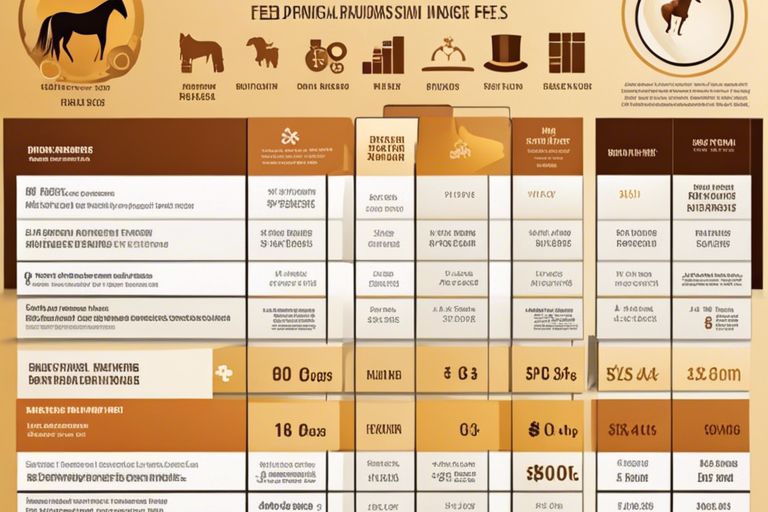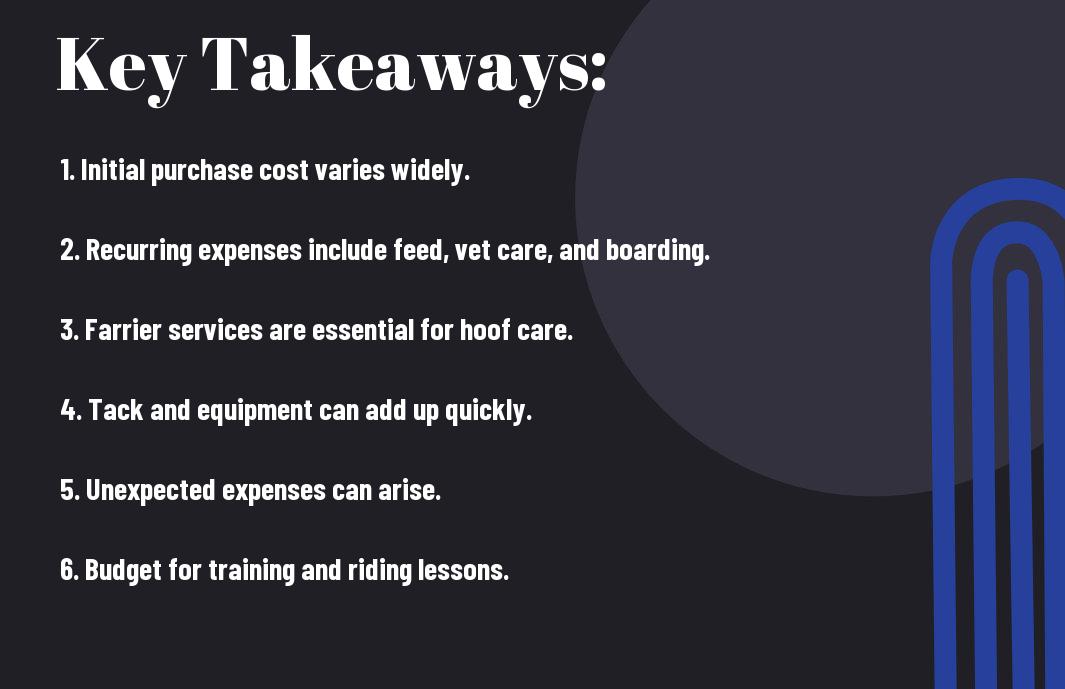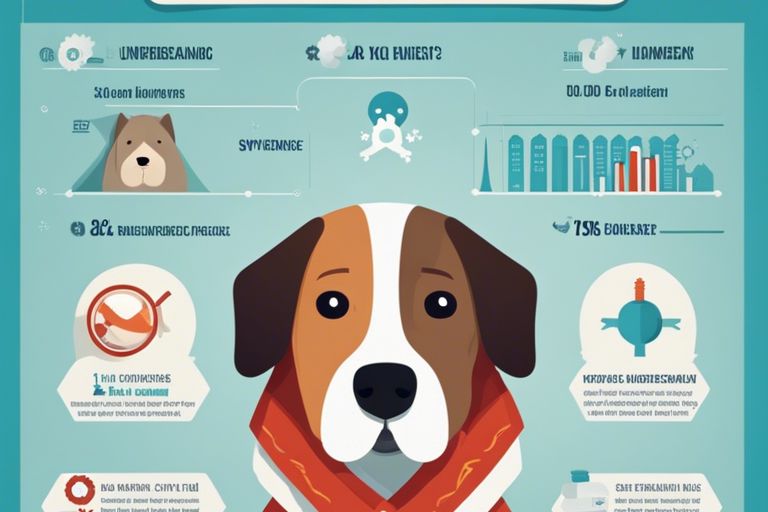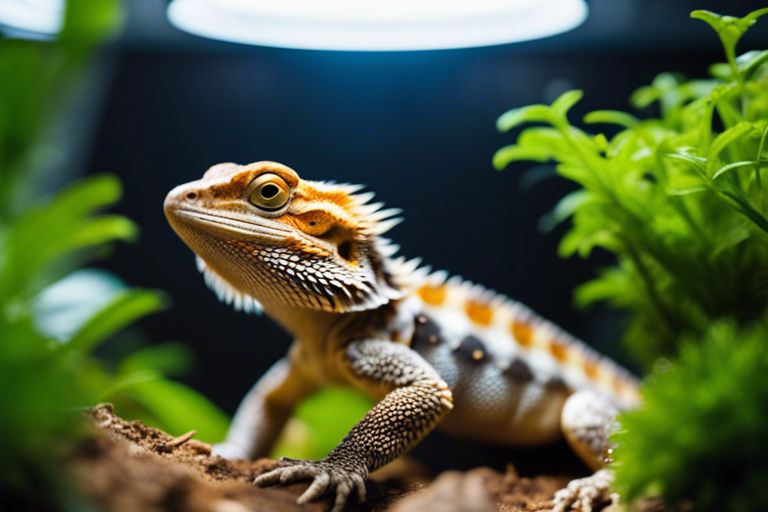Purchasing a horse can be an exhilarating experience, but it’s important to consider the financial responsibilities that come with horse ownership. As someone who has owned horses for over a decade, I can confidently say that the costs associated with having a horse go far beyond the initial purchase price. From boarding and feed to veterinary care and riding equipment, the expenses involved in owning a horse can quickly add up. In this blog post, I will provide an in-depth look at the various costs associated with owning a horse, so you can make an informed decision about whether horse ownership is right for you.
Key Takeaways:
- Initial purchase price: The cost of buying a horse can vary significantly, depending on factors such as breed, age, and training. Plan to spend several thousand dollars, at least, for a quality horse.
- Boarding and feeding: These ongoing expenses can add up quickly, especially if you choose to board your horse at a facility. Factor in costs for feed, bedding, and stable rent.
- Healthcare and maintenance: Regular veterinary care, vaccinations, dental work, and farrier services are essential for maintaining your horse’s health and well-being. Be prepared to budget for these expenses.
- Training and equipment: Training fees and the cost of tack, grooming supplies, and other equipment can contribute to the overall cost of horse ownership. Consider these expenses when planning your budget.
- Unexpected expenses: It’s important to have a financial cushion for unexpected costs, such as emergency veterinary care or repairs to equipment or facilities. Factor in some extra money for these unpredictable expenses.
Understanding the Costs of Horse Ownership
The first thing you need to consider when thinking about owning a horse is the cost involved. Horses can be expensive to own and care for, and it is important to understand all of the expenses involved before making the commitment to buy one. As a horse owner, I have learned a lot about the costs involved, and I want to share that knowledge with you.
Initial Purchase Costs
When you first decide to purchase a horse, there are several initial costs to consider. The most significant expense is, of course, the cost of the horse itself. The price can vary widely depending on factors such as breed, age, training, and competition record. In addition to the cost of the horse, you will need to consider the cost of tack and equipment, as well as any transportation fees if you need to have the horse moved to your location. It is important to factor in all of these expenses when budgeting for the initial purchase of a horse.
Ongoing Expenses
Once you have purchased a horse, the costs do not stop there. There are a number of ongoing expenses that you will need to budget for. These include boarding or stabling fees, feed and bedding, veterinary care, farrier services, and regular grooming and training. It is important to be prepared for these ongoing expenses, as they can add up quickly. One of the most important ongoing expenses to budget for is veterinary care. Horses can be prone to a number of health issues, and regular check-ups and vaccinations are essential to keeping your horse healthy. Additionally, farrier services are crucial for maintaining your horse’s hoof health, and should not be overlooked when budgeting for ongoing expenses.

Types of Horse Expenses
While owning a horse can be a rewarding and fulfilling experience, it also comes with its fair share of expenses. Here are the main types of horse expenses to consider:
- Feed and Nutrition
- Veterinary Care
- Training and Exercise
- Grooming and Maintenance
After researching and owning horses for several years, I have found that these are the primary areas where horse owners tend to spend the most money.
Feed and Nutrition
When it comes to feed and nutrition for your horse, it’s important to provide them with a balanced diet to keep them healthy and strong. This includes a combination of hay, grains, and supplements to ensure they are receiving all the necessary nutrients for optimal health and performance.
Veterinary Care
Proper veterinary care is essential for keeping your horse in good health. From annual check-ups and vaccinations to emergency care and dental work, veterinary expenses can add up quickly. It’s important to budget for these costs to ensure your horse receives the care they need.
Training and Exercise
Training and exercise are important for keeping your horse fit, well-mannered, and prepared for any activities or competitions you have in mind. Whether you invest in professional training services or dedicate time to working with your horse yourself, it’s crucial to prioritize their mental and physical development.
Grooming and Maintenance
Keeping your horse clean and well-groomed is not only essential for their appearance, but also for their health and well-being. This includes regular grooming sessions, hoof care, and maintaining their living environment to ensure they are comfortable and free from harm.
Financial Planning for Horse Ownership
Now that you’ve decided to become a horse owner, it’s time to plan for the financial responsibilities that come with it. There are several things to consider when it comes to the cost of owning a horse, and in this chapter, I’ll walk you through the steps to financially prepare for this exciting journey.
Before I dive into the details, I’d like to direct you to an insightful discussion on the Reddit forum titled How much does it cost you a year to own a horse or two? …. This thread provides a wealth of firsthand experiences and advice from fellow horse owners, giving you a realistic view of the financial commitment involved in horse ownership.
Budgeting for Horse Expenses
When it comes to budgeting for horse expenses, it’s essential to consider both the recurring and unexpected costs that come with owning a horse. Your budget should include the cost of feed, bedding, grooming supplies, farrier visits, veterinary care, and training. It’s crucial to be realistic about these expenses and to budget for potential emergencies. Additionally, keep in mind that the cost of owning a horse can vary depending on factors such as location, the horse’s age, and its specific needs.
Savings and Insurance Options
Establishing savings and exploring insurance options for your horse is another crucial aspect of financial planning for ownership. Setting aside savings for unexpected vet bills or emergency situations can provide peace of mind and financial security. Additionally, investing in equine insurance can help mitigate the financial risks associated with owning a horse, covering expenses related to accidents, illness, and even mortality. When exploring insurance options, it’s important to thoroughly research and compare different policies to find the best fit for you and your horse.

Conclusion
Considering all points, it is clear that owning a horse is a significant financial commitment. From initial purchase costs to ongoing expenses such as feed, veterinary care, and boarding, the cost of horse ownership can quickly add up. It’s important to carefully consider your budget and financial resources before deciding to bring a horse into your life. I highly recommend referring to the Annual Horse Expense Sheet provided by Equine Guelph to get a better understanding of the potential expenses involved in horse ownership.Annual Horse Expense Sheet
FAQ
Q: How much does a horse cost?
A: The cost of a horse can vary widely depending on factors such as breed, age, training, and overall health. On average, a horse can cost anywhere from a few hundred to several thousand dollars.
Q: What are the initial expenses involved in owning a horse?
A: The initial expenses of owning a horse include the purchase price, tack and equipment, veterinary care, farrier services, and boarding or stable fees. These costs can add up to several thousand dollars.
Q: What are the ongoing expenses of owning a horse?
A: The ongoing expenses of owning a horse include feed, hay, bedding, regular veterinary and farrier care, as well as additional expenses for training, competitions, and other activities. These ongoing costs can range from a few thousand to tens of thousands of dollars per year.
Q: Are there any unexpected expenses associated with owning a horse?
A: Yes, there are often unexpected expenses associated with owning a horse, such as emergency veterinary care, unexpected maintenance or repairs, and other unforeseen costs that can arise in the care and upkeep of a horse.
Q: What are some tips for managing the expenses of owning a horse?
A: To manage the expenses of owning a horse, it’s important to budget for both expected and unexpected costs, shop around for the best prices on feed and supplies, invest in preventive veterinary care, and consider options such as co-ownership or leasing to share the expenses with others.








Leave a comment